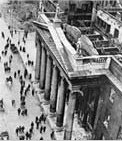Appreciating the Living: The Politics of the Last Atrocity
Being Irish and walking among American flagpoles with their flags at half-mast has me thinking of the dead.
You know the way we sing happy-clappy sing-a-longy songs that when you listen to the lyrics are actually about men, having their wicked way with women, green grass, foggy dew, whack for the daddio, until the woman asks about love, marriage, or some other such folly, only for the man to scoff at the notion and announce how he is already happily married, and usually to the fairest little woman you ever did see?
And not a mention of contraception anywhere?
Well some of them aren’t. Some Irish songs are about death. I don’t mean the happy ones where you kill the baby with the penknife, or the husband by drowning - those are party songs. I mean the laments for lives lost making a better world, or just killing the English.
Irish dead people are great. You found out how great John McGahern was a year ago when he died, but you didn’t realize how great Paul Muldoon was when he didn’t die in Kansas City.
When I saw Irish poet Desmond Egan a few weeks back I was thinking how great he’s going to be when he’s dead. People will probably tell me about him.
Dermot Morgan - who you may know as Father Ted, or a hit and miss comedian before that - is probably the most popular Irish comedian ever - or at least he was the on the day he died. Had he been alive Morgan would probably have died of embarrassment at the coverage.
I was in Dublin a couple of years ago at the unveiling of the statue of Phil Lynott on Harry Street, and I’ve been to his grave over on Howth. I can understand waiting until he dies before putting, say Gary Moore, in a grave - but I bet you he doesn’t get a statue until after he dies. Or Shane, or Christy, or Bob.
Anyway, we Irish love dead people. In fact we love them so much we make them dead. And then we love them publicly. Just twelve months back we celebrated the 90th anniversary of the 1916 Easter Rising (of which the best link in the sidebar is still Langerland’s Rising Animation).
But that wasn’t enough dead people to think of so then we turned our thoughts to more than a million soldiers who died in the bloody four-month assault in North France that began on July 1, 1916 - the Battle of the Somme.
Last year Taoiseach Bertie Ahern said of the Somme:
More than 5,000 men of the 36th Ulster Division fell in the first two days in July 1916. They fought alongside 200,000 Irish men from every county of Ireland. Their bravery was no less than that shown by the insurgents of Easter Week
To commemorate this anniversary of carnage, the Irish Post Office - An Post - then launched a postage stamp which the Taoiseach unveiled - presumably using a very small curtain.
An Post also issued a stamp to commemorate the Rising - the actual 1916 Rising that is, and not the Langerland cartoon.
I deliberately let this year’s anniversary of the 1916 Rising slip past unmentioned here on Irish KC (though a commentor did bring it up). The thing about political violence is that you end up with anniversaries of anniversaries.
As we went through March recently I remembered the anniversaries of the days in the second half of March 1988 when the SAS killed IRA members in Gibraltar, followed by Michael Stone’s murderous assault on the Gibraltar IRA funeral at Milltown, followed by the IRA killing the British corporals who drove into the funeral of the IRA man killed at the previous IRA funeral. And so on. I can remember the details, all the names, the atmosphere.
A couple of days ago we passed the 18th anniversary of the most harrowing weekend I’ve personally experienced. On April 15, 1989 I was at the other semi-final of the FA Cup, the one which didn’t kill 96 people.
Our brothers, fathers, sons, and friends were at the other game. We had all started the weekend together and then travelled to our fixtures in different cities before, we believed, we would return and reunite again to end our weekend together.
Like anybody’s horror stories the memories of every moment of that very long weekend are clear and horrible in my mind. And everybody grieves in their own way.
But I don’t know that remembering does much good. I’m not talking about personal involvement here; I’m talking about the wider population actively remembering. Laying flowers, and praying publicly for people you never knew. Is it wrong instead to remember privately, and to have a public reaction of talking, discussing, questioning?
When a group of people unrelated to people who have died, tell another group of people also unrelated to those who have died, not to express their views because it is disrespectful, because it is using the dead, are they not doing the exact same thing?
It all reminds me of thirty years of Irish carnage and every bloody bomb and every bloody murder and how the memory of the killed was claimed by one group and used as a reason to not talk. And sometimes to not talk about talking. We called it “the politics of the last atrocity”. For thirty years.
So when people unconnected to murder victims say now is not a time to do anything other than grieve, to sympathize, to remember, because there’ll be plenty of time later to address anything that might need addressing, I’m tempted to ask how they know we have that time. What if we don’t? Do we just go on grieving, sympathizing, and remembering? For thirty years?
If we didn’t put so much effort into professionally remembering those who went before us, and put that effort into appreciating more those who are coming along next, or even, somewhat controversially, those who are alive today, would that translate into a culture that provided better healthcare, better education, and that sort of thing?
And ideally, less dead people in the future?
I’m expecting a letter from home shortly. I’ll let you know if the stamp commemorates dead Irish people, or is another one of the really great living Irish birds I usually get. Maybe it’ll be a dead bird. You know, like the roadkill collection?
See also:
• Co-existence: Kansas City & the Lebanon
• Black Shamrock and W
• Bobby Sands

 Eolaí gan Fhéile:
Eolaí gan Fhéile:










